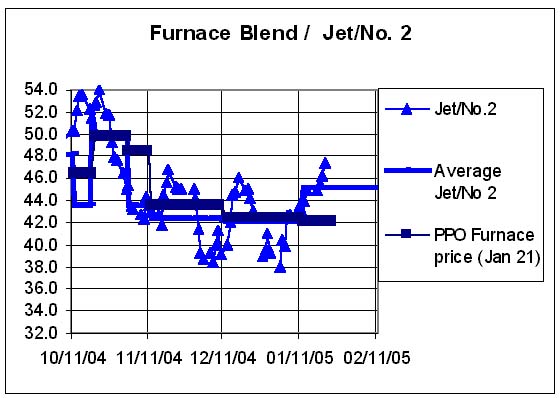|
The following is being distributed at the request of the Petroleum Pricing Office: Petroleum Pricing Office makes early pricing adjustment to furnace oil The Public Utilities Board�s Petroleum Pricing Office (PPO) determied the criteria for its interruption formula (see backgrounder) were met for No. 2 blend furnace oil, and the maximum allowable price will increase by 2.95 cents per litre (cpl) in Newfoundland and Labrador effective 12:01 a.m. Tuesday, January 25. The criteria were not realized for any of the other fuels regulated by the PPO, and there will be no adjustments at this time. As well, no price changes will be made in regions where a price freeze is in effect. Colder-than-average temperatures along the U.S. northeast coast and Atlantic Canada, forecasts of increased global demand for fuel, and potential threats to available oil supplies have combined to dramatically move market prices upward in recent days, particularly when it comes to home heating fuel. David Toms, PPO director (acting), said even with this increase, Newfoundland and Labrador furnace oil prices (excluding taxes) continue to remain among the lowest in Atlantic Canada, according to information obtained from MJ Ervin and Associates. Mr. Toms noted the fuel market has been highly reactive to the ongoing global factors that could impact fuel supply availability. This behaviour has resulted in increased pressures on all fuels regulated by the PPO, but more so for furnace oil at this time. "There is a real sense that the demand for fuel, particularly for home heat at this time of year, is a concern when there are so many ongoing and significant factors on the global scene that could threaten available supplies," he said. "We are entering a period where colder-than-average temperatures are expected, and this will likely mean increased demands for the product should they occur. We will continue to objectively monitor the market to see if this behaviour continues to impact prices in Newfoundland and Labrador for this or any other product that we regulate." MARKET OVERVIEW Mr. Toms explained that since January 12 (the beginning of this pricing period), market-price increases for refined petroleum products - specifically home heating fuel - have occurred for myriad reasons. Despite the fact the U.S. Energy Information Administration (EIA) reported last week that oil and home heating fuel inventories had increased, which helped eased fears about a winter fuel supply crunch to meet anticipated demand, other issues prevailed to cause a fast-paced pricing resurgence late last week. Topping the list of numerous global events affecting heating fuel prices is the forecast of colder-than-average temperatures along the U.S. northeast coast and Atlantic Canada (regions where home heating fuel consumption is higher). Other factors that continue to play a significant role in keeping fuel prices volatile include:
BACKGROUNDER PPO benchmarks are established based on the average prices of refined products in the period since the last time maximum prices were established. For the interruption formula to be used on gasoline and distillate fuels, the PPO requires the average of market prices to be 3.5 cpl greater or less than the current PPO benchmark prices (except propane, which requires +/- 5.0 cpl) over five market business days. As well, the interruption formula will only be used five days after the last pricing adjustment and as long as making the change doesn�t interfere with the regular pricing schedule. Illustrated in the following graph is the market-price performance of No. 2 furnace oil regulated by the PPO for recent pricing periods up to January 21, 2005:
Media contact: Michelle Hicks, Communications, 1-866-489-8800 or (709) 489-8837 1.Heating Fuels - Maximum Tank Wagon (or ** Tank Farm) Prices - January 25, 20052005 01 25 9:35 a.m. |
||
|





